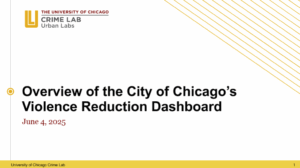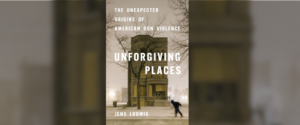2017
Gun Trace Report
Since 2013, the Chicago Police Department has recovered nearly 7,000 “crime guns” each year. For the purposes of this report, a crime gun refers to a firearm recovered by CPD that was illegally possessed, used, or suspected to be used in furtherance of a crime.
The overwhelming majority of these firearms were originally purchased outside of the city limits and brought into Chicago. So far in 2017, CPD is already on pace to exceed last year’s gun recoveries. It is self-evident that the availability of illegally circulated firearms in Chicago is directly connected to its deadly street violence. Simply put, each conflict becomes potentially more lethal due to easy access to a gun.
In an unfortunate but persistent reality, certain retailers and jurisdictions disproportionately account for the guns trafficked into Chicago that sustain its illegal gun market and associated violent crime.

Webinar: Overview of the City of Chicago’s Violence Reduction Dashboard
The Crime Lab hosted a webinar that explored the City of Chicago’s Violence Reduction Dashboard—a publicly available tool launched to support efforts to reduce gun violence through transparent, real-time data.

Unforgiving Places: The Unexpected Origins of American Gun Violence
Crime Lab Pritzker Director Jens Ludwig authored a book that argues the lack of progress in reducing gun violence ultimately stems from our having misunderstood the nature of the problem, and that behavioral science gives us a new way to understand – and solve – gun violence in America.

2025 End-of-Year Analysis: Chicago Crime Trends
Violent crime declined substantially in 2025 across the country, including in our home city of Chicago – which experienced 168 fewer homicides through mid-December 2025 compared to the same period last year.

Local Gun Violence Dashboards
Chicago’s Violence Reduction Dashboard, launched by the Crime Lab in 2021, is featured in a toolkit created by Everytown for Gun Safety Support Fund as a part of its Gun Violence Data Fellowship.
Latest Updates
Former NYPD Chief of Department Kenneth E. Corey Named Executive Director of the Policing Leadership Academy
CHICAGO, IL — The University of Chicago Crime Lab today announced that Kenneth E. Corey has been appointed Executive Director of its Policing Leadership Academy (PLA), a first-of-its-kind executive education program designed to help police leaders reduce gun violence and build trust in the communities they serve.

Homicide rate declines sharply in dozens of US cities, a new report shows
The AP’s Claudia Lauer speaks with Crime Lab faculty director Jens Ludwig about the declining homicide rate in cities across the United States.

What it will take to fix American policing
Host Megan McArdle speaks with former New York City police commissioner William Bratton and former NYPD chief and new Policing Leadership Academy executive director Kenneth E. Corey about their work at the Academy and the program’s goals to reduce violence and improve fairness in policing.

